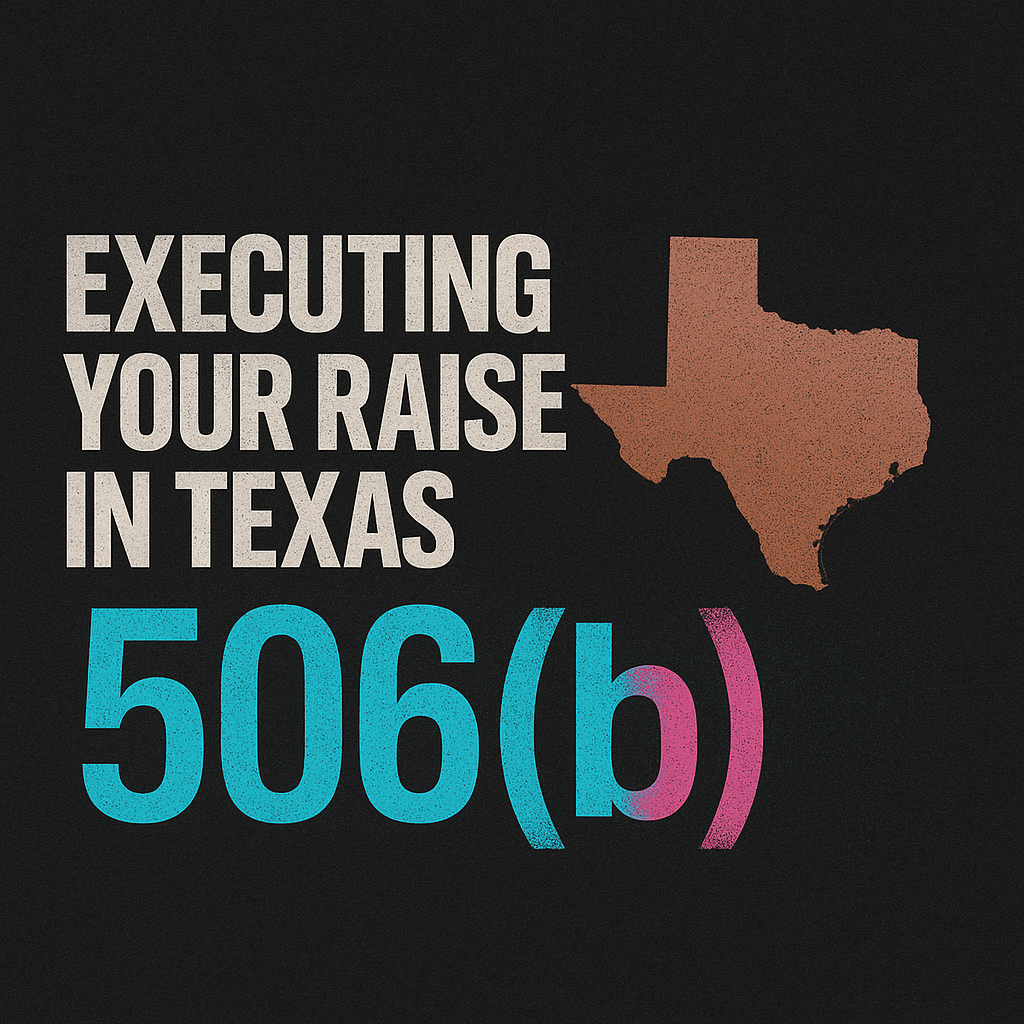Executing Your Raise in Texas: 506(b) vs 506(c), Advertising Hygiene, Finders, Integration, and Real‑World Scenarios

Choose your lane first: 506(b) or 506(c)
If you can keep outreach private → 506(b)
- No general solicitation. Keep to known, substantive relationships and one‑to‑one outreach.
- Practically, limit purchasers to accredited investors for startup rounds.
- Provide a coherent disclosure set (deck, memo/PPM if warranted, financials, risk factors).
- If a Texas resident buys, file the Texas notice via EFD.
If you need to market publicly → 506(c)
- General solicitation allowed (web/social/PR/events).
- You must take reasonable steps to verify accreditation (third‑party letters from broker‑dealer/RIA/CPA/attorney or document review). Self‑certification alone is insufficient.
- Maintain consistent, accurate messaging across your site, data room, and press.
- File Texas notice after the first Texas sale.
Five‑year reuse window (506(c)): If an investor was verified as accredited within the past 5 years in a 506(c) offering and certifies they remain accredited, you may rely on that prior verification—document it.
What is “general solicitation”?
General solicitation includes:
- Public posts (“We’re raising,” terms, target amounts), landing pages collecting interest, paid ads
- Open demo days and conference pitches to the public
- Mass emails to purchased lists
Rule 148 (demo days) may exclude some sponsor‑run events from being solicitation (e.g., universities, governments, nonprofits, angel groups, incubators/accelerators) if specific conditions are met. If you can’t clearly meet Rule 148, assume it’s general solicitation and operate under 506(c).
Website & social hygiene (practical rules)
Running 506(b):
- Remove/avoid current offering terms and “we’re raising” language on public pages.
- Gate investor materials (login‑only data room).
- No lead‑gen ads to fill a private pipeline.
- If you must present at broad events, avoid discussing a current raise.
Running 506(c):
- It’s fine to be public, but anti‑fraud still applies—keep all claims accurate and consistent with your disclosure set.
- Archive verification proofs contemporaneously.
Finders & broker‑dealer risk in Texas
High‑risk pattern: Paying transaction‑based compensation (percent of funds, success fees, per‑investor bounties) to unregistered people who introduce/solicit investors. Expect enforcement and rescission risk.
Issuer exemption (limits):
- Your owners/officers/directors/employees are not dealers only if all are true:
- not hired to sell securities,
- selling activities are incidental to bona fide non‑securities duties, and
- compensation is based entirely on those non‑securities duties (no commissions/bonuses keyed to capital raised).
Safer paths:
- Use a licensed broker‑dealer (with agents licensed in Texas).
- For unlicensed advisors, limit to non‑solicitation services; pay hourly/flat fees not contingent on funds raised.
- Equity for services: use time‑based vesting for bona fide services; avoid vesting triggers tied to introductions/dollars raised.
Intrastate & Reg CF (brief guides)
Texas intrastate (Rule 147/147A + state exemption):
- Keep issuer, offers, and sales within Texas (strict).
- Gate marketing to Texas and confirm residency.
- One out‑of‑state sale or widely accessible web page can blow the exemption.
- Confirm any Texas filing and fee details on TSSB; some steps may be through EFD.
Regulation Crowdfunding (Reg CF):
- Conducted through a registered portal/broker‑dealer.
- Use the portal’s Form C, Q&A, updates, and closing workflow.
- Outside the portal, stick to tombstone‑style communications and link back to the portal.
- Texas anti‑fraud still applies.
Integration & sequencing (Rule 152)
Risk: Closely timed offerings may be treated as one offering (“integration”), potentially breaking your exemption (e.g., public 506(c) activity tainting a nearby 506(b)).
Guardrails:
- 30‑day safe harbor (Rule 152(b)(1)): Offerings separated by >30 days aren’t integrated, provided purchasers in any no‑solicitation offering weren’t solicited by general solicitation (or you had a pre‑existing, substantive relationship).
- Principles‑based test: Even inside 30 days, keep documentation showing each offering complied independently.
- Separate funnels: Distinct landing pages, decks, lists; public traffic goes only to your 506(c) channel.
Real‑world scenarios (how to execute)
1) Texas‑only friends‑and‑family (506(b))
- Keep outreach private; use standardized subs + investor questionnaire.
- Instruments: SAFEs or convertible notes (they’re securities).
- After first sale: file Form D and Texas notice via EFD (verify fee).
- Avoid celebratory fundraising posts until after closing.
2) Broadly advertised 506(c) with TX & CA investors
- Align public messaging and verification (third‑party letters or docs).
- File federal Form D; then Texas/California notices (EFD where available).
- Keep verification records current; consider reuse window when applicable.
3) Texas intrastate seed
- Confirm eligibility; gate marketing/residency.
- Apply legends/resale restrictions per intrastate rules.
- Confirm any Texas filings (check TSSB), including whether EFD is used.
4) Reg CF with Texas investors
- Run everything in‑portal; keep off‑portal messaging compliant.
- If running other offerings, harmonize disclosures and avoid integration risk.
Founder documents & devices (quick guidance)
- PPM or disclosure‑lite?
- All‑accredited/simple terms → disclosure‑lite may suffice.
- Complexity, non‑accredited, or frontier risk → PPM recommended.
- SAFEs/convertible notes: Treat as securities; disclose valuation cap/discount, interest (notes), maturity, conversion scenarios.
- Keep a change log and update all pending investors when material terms change.
Related reads (link internally):
- Convertible note caps and interest rates
- Convertible note liquidation preferences
- Series Seed Preferred Stock
- How many shares to authorize
- Crowdfunding for startups
References & Sources
- Rule 148 (demo days): https://www.ecfr.gov/current/title-17/section-230.148
- Rule 152 (integration): https://www.ecfr.gov/current/title-17/section-230.152
- Reg D (17 CFR Part 230): https://www.ecfr.gov/current/title-17/chapter-II/part-230
- NASAA EFD: https://www.efdnasaa.org
- Texas State Securities Board: https://www.ssb.texas.gov
Feedback & Corrections
See our Corrections Policy and email [email protected] with updates or suggestions.
Disclaimer
Informational only; not legal advice. Requirements change—verify current Texas rules/fees on the TSSB site and consult counsel for your situation.

